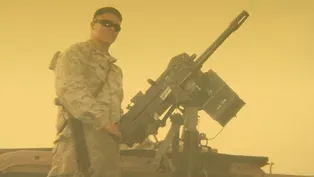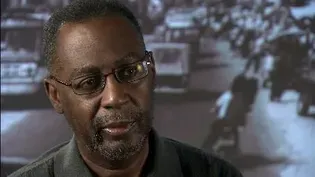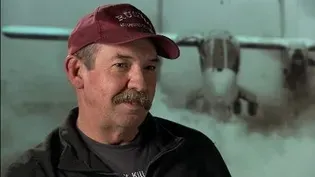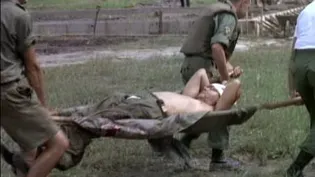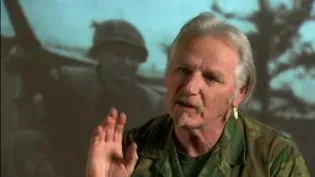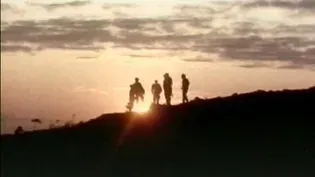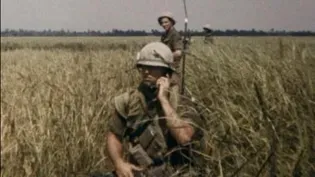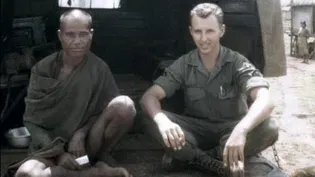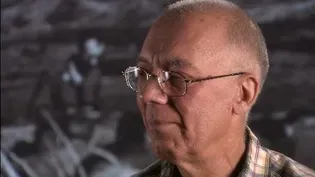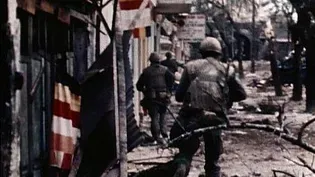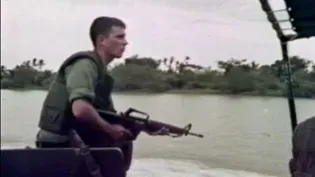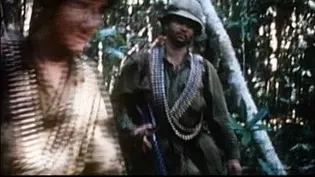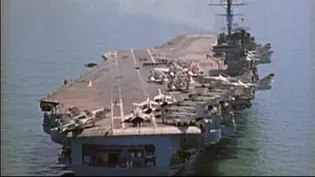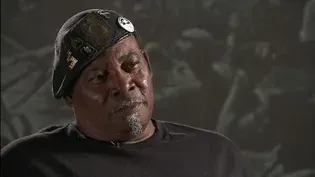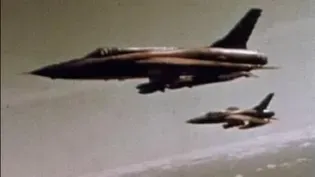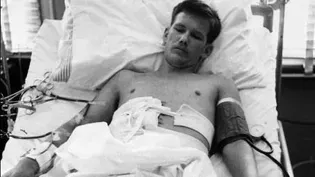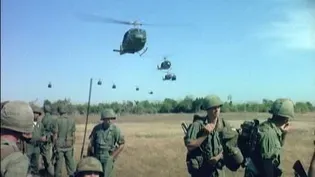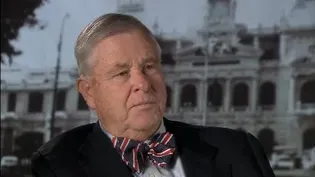
Vietnam: Escalation - Naval Presence
Clip | 7m 16sVideo has Closed Captions
Navy veterans explain their experiences off shore supporting Special Forces.
1964 Navy veterans explain their experiences off shore supporting Special Forces in the earliest days of the Vietnam War. Two brothers remember their tours of duty and the bonds of combat brotherhood. (Part 2/7)
Problems with Closed Captions? Closed Captioning Feedback
Problems with Closed Captions? Closed Captioning Feedback
Wisconsin War Stories is a local public television program presented by PBS Wisconsin

Vietnam: Escalation - Naval Presence
Clip | 7m 16sVideo has Closed Captions
1964 Navy veterans explain their experiences off shore supporting Special Forces in the earliest days of the Vietnam War. Two brothers remember their tours of duty and the bonds of combat brotherhood. (Part 2/7)
Problems with Closed Captions? Closed Captioning Feedback
How to Watch Wisconsin War Stories
Wisconsin War Stories is available to stream on pbs.org and the free PBS App, available on iPhone, Apple TV, Android TV, Android smartphones, Amazon Fire TV, Amazon Fire Tablet, Roku, Samsung Smart TV, and Vizio.
[gentle acoustic music] - William Moore: A buddy of mine came over and said, "Wow, we can get all this good schooling by going in the Navy!"
I still have the flyer showing the outline of the Nautilus, which was the cutting-edge nuclear submarine back then.
And got ahold of a recruiter.
August 8, 1961, we went like this, and off we went for our Navy careers.
And I wanted to get into submarines, obviously, so that was the whole deal.
- Wayne Jensen: I had just finished my junior year in high school when I turned 17, and I always felt that I wanted to make a career of the Navy.
And I remember it well because my mom and dad got into a big argument.
My mom didn't want me going in the service.
The deciding factor was my dad telling her, "Look, he's gonna go when he's 18.
"And he's gonna be bitter at you for the year that you wasted of his life."
So she finally consented.
- Daniel Schaller: I'd been at college, and I joined the Navy.
They were looking at my records and they thought I should go to electronics school.
My dad was a mechanic and I'd worked in a garage in high school, y'know, in a service station, so.
I didn't really know electronics, but I learned.
I found out I had a pretty good affinity for learning that and working with it.
I can't remember if I knew about Vietnam at the time or not.
- William: I came on board the Perch over in Subic Bay, Phillipines.
Come along around the month of August of '64, everything kinda changed.
They were coming down the middle of the streets in Olongapo, shagging everybody back to the base that war had broken out, and we didn't know what they were talking about.
And, "War?"
And he said, "Yeah, yeah, the Viet Cong fired on the Maddox ."
And we said, "Who are the Viet Cong and what's the Maddox ?"
[explosions] - I remember it was at night, off the coast of Vietnam.
I was a radarman at that time on watch in what they called CIC, kind of an information center.
So we had about seven different radio frequencies that we would be monitoring at any time.
And I do recall pandemonium.
Turner Joy and Maddox , North Vietnamese gunboats were attacking them and they were taking them under fire.
Hectic; everybody went to general quarters.
But so far as being the catalyst for our active involvement in Vietnam, the conspiracy theories as to whether or not they were actually attacked, I don't know to this day.
- So that was the beginning of it.
Well, we went right over to the fuel piers, and once again, bullets, beams, and black oil.
We took on food, fuel, and ammunition and headed over.
And we started operating with SEAL team, Green Berets, UDT, frogmen, ROK special forces.
- We started doing surveillance and electronic countermeasures.
It was basically receivers that were picking up radars and track radars in Russia and Red China, and they'd fly off of carriers.
We had a twin engine Douglas A-3, and in the back was electronic equipment and the seats for us, four of us.
When we were flying up along Russia, you know, it come right up alongside of it, flying up with a big 21, which was their best fighter aircraft at the time.
And it had their missiles; we could see them.
And you'd sit and go up there and wave at 'em.
Once in a while, one of the guys would give 'em the international signal, you know.
The operations with the special forces is what we did.
Those were our torpedoes, so to speak.
And what these guys would do, beach recon, sabotage, whatever their mission was, our job was to get 'em there.
Of course, we were hoping there wasn't anybody there waiting for us.
I was bridge phone talker with a lot of the battle stations, so I was very fortunate to be up there.
The engine men and a lot of the guys that never got topside would not get a chance to see anything.
- There was a lot of action once, you know, in the couple of years I was over there on board carriers too, y'know.
In fact, I sat up front once just for one landing on the carriers, and you come in looking at it, and it looks so much like a postage stamp there.
And you wonder, "How in the world could a guy be trained to land on that thing?"
And as soon as you touch down, you gave it full speed 'cause if the cable snapped, you wanted to have the power to get back off again.
Usually, you didn't find people when they went over.
You did it so much, twice a day for a long period of time, and you always thought that, my goodness, that next time, it might be your time, y'know?
- All of a sudden, one morning, I got a shoe thrown at my head.
And I woke up and I was ranting and raving, what the heck was going on, and I looked over and there my younger brother was.
- Bruce Jensen: I walked into the barracks just as reveille was going off, and the first guy that woke up, I asked him, I says, "Can you tell me where I can find Jensen?"
And he says, "Well, hand me my shoes."
So I gave him his shoes, and he turned around and he whipped one of 'em, and hit Wayne in the head.
[laughs] That was Wayne's first idea that I was gonna be stationed with him.
He says, "What the hell are you doing here?"
I says, "Well, we got duty together."
[chuckles] - Wayne: Bruce and I, we reported down to San Diego.
We picked up the 3rd Marines.
Spent two or three trips going back and forth into Vietnam.
The first, and it was the biggest amphibious operation since the Korean War.
And my term of enlistment was due to come up, so Bruce carried my sea bag off.
And...
I watched the ship pull out with my brother, going to Vietnam.
- Several of the guys that we did operate had gotten killed over there.
And it just brought it home that it was a real war.
Y'know, you're with 'em, you're out drinking with 'em on the beach when you're having fun, and you're out there going to war with 'em and...
They are my closest friends.
Sorry.
Oh... - I think that's the way most people in the service get through it, is by joking around, by doing stupid things, you know.
It's to take your mind off of the real.
And what was real was that you had a chance to die anytime you went on one of those.
And we knew it; we all knew that.
We were very young, but after you'd been flying there for a year, you know, you feel like an old man.
Video has Closed Captions
OIF Army veteran Crystal hits the road to find her way home to an organic farm. (5m 20s)
Video has Closed Captions
Vietnam War veterans help today's veterans cope with the invisible scars of combat. (30s)
Vietnam: Draw Down - Rear Echelon
Video has Closed Captions
Veterans assigned to support jobs in the military describe life on and off duty. (7m 40s)
Vietnam: Draw Down - Hamburger Hill
Video has Closed Captions
Veterans recall the haunting memories of a battle they waged for many days. (6m 49s)
Vietnam: Draw Down - Firepower
Video has Closed Captions
Air Force veterans recount dangerous missions targeting the North Vietnamese Army. (8m 1s)
Vietnam: Draw Down - Broken Bodies
Video has Closed Captions
Wounded veterans and hospital staff describe field hospital scenes and returning home. (7m 17s)
Vietnam: Turning Point - Walking Point
Video has Closed Captions
Veterans describe the dangers and responsibilities of walking point. (6m 56s)
Vietnam: Turning Point - The Price
Video has Closed Captions
Veterans reflect on the staggering casualties in Vietnam, and how they coped. (8m 19s)
Vietnam: Turning Point - TET 1968
Video has Closed Captions
The Tet Offensive shocked both soldiers and the American public. (8m 13s)
Vietnam: Turning Point - Montagnards
Video has Closed Captions
Veterans discuss working with the Montagnards, people indigenous to Vietnam. (6m 57s)
Vietnam: Turning Point - Khe Sanh
One of the bloodiest battles of the Vietnam War took place at Khe Sanh. (7m 36s)
Vietnam: Turning Point - Hue City
Video has Closed Captions
The battle at Hue City highlighted the dire state of the Vietnam War. (6m 47s)
Vietnam: Turning Point - Brown Water Navy
Video has Closed Captions
River-based Army and Navy veterans describe facing enemy attacks and Agent Orange. (8m 12s)
Vietnam: Escalation - Send in the Marines
Video has Closed Captions
Marines describe their arrival in Vietnam and the difficulty of jungle warfare. (8m 7s)
Vietnam: Escalation - Naval Presence
Video has Closed Captions
Navy veterans explain their experiences off shore supporting Special Forces. (7m 16s)
Vietnam: Escalation - Elusive Enemy
Video has Closed Captions
Encounters with underground tunnels and their growing uncertainty in the mission. (8m 2s)
Vietnam: Escalation - Dropping Bombs
The allure, challenges and heartbreaking loss of early air combat in Vietnam. (6m 44s)
Vietnam: Escalation - All Hell Broke Loose
As missions became more dangerous, casualties rose. (8m 48s)
Vietnam: Escalation - Airmobile
Veterans of the helicopter brigades describe experiences of bravery, danger and loss. (7m 54s)
Vietnam: Escalation - Advise and Assist
Explore the early events that set the conflict and United States participation in Vietnam. (6m 6s)
Providing Support for PBS.org
Learn Moreabout PBS online sponsorshipSupport for PBS provided by:
Wisconsin War Stories is a local public television program presented by PBS Wisconsin

